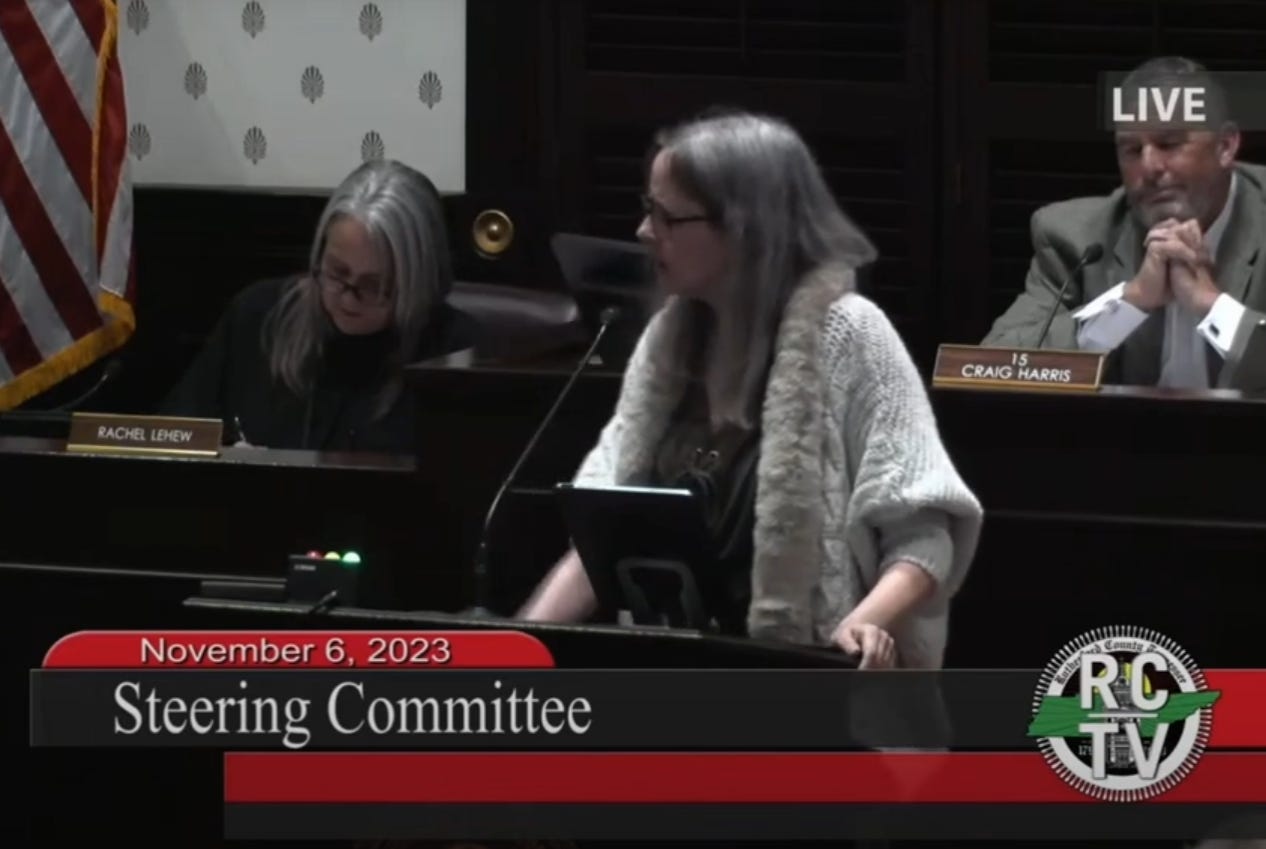City Ordinance Banning Public Homosexuality Reaches Rutherford County Libraries
In Murfreesboro, Tennessee, a new city ordinance targeting public homosexuality is hitting libraries. "When in History have the ones banning books been the good guys," says local activist.
Editorial Update: At the time of the story’s publication, homosexuality was targeted as “sexual conduct.” As of November 17, 2023, a new ordinance will go into effect that removes homosexuality from 21-71. While this will make the targeting of LGBTQ+ people less explicit, the vague “community standards” section will still likely be used to target Pride events and books. The City of Murfreesboro is currently defending itself in a lawsuit to explicitly enforce it in this way.
A municipal mandate enacted this past June in Murfreesboro, Tennessee, is now being used to target books in the local library system. The ordinance, outlawing "indecent behavior" in public and prohibiting "indecent materials," is alarmingly vague in its delineation of indecency. This definition used in the law links back to a city statute that explicitly bans public homosexuality or materials promoting homosexuality. The code has already been used to target local Pride events. Now, the code’s enforcement has reached the local library system, where at least four books, all containing LGBTQ+ themes, have been pulled from the shelves.
The ordinance in question is city ordinance 23-O-22. The ordinance states that the community “has the right to establish and preserve contemporary community standards.” It goes on to state that “indecent behavior” or “display” of “indecent materials” would be banned by the new provision. Importantly, the definitions of indecency link back to the city codes definition in section 21-71 of Murfreesboro city codes, which states that “sexual conduct” barred under the provisions includes “homosexuality.” The city ordinance further states that any “behaviors, materials or events that are patently offensive to the adult community” in Murfreesboro would also be banned. Finally, it gives police officers the right to enforce the provisions and states that anybody using city funds for the banned events or materials could be charged with further crimes.
You can see the particular provisions in the ordinance here:
Though the ordinance was not immediately enforced, in recent months, various city officials have begun using it to target the LGBTQ+ community in a variety of ways. The Rutherford County Library Board, chiefly composed of appointees from Murfreesboro’s city council and the Rutherford County Commission, met in August to remove books that might infringe upon the new statute. At a packed meeting in August, library authorities resolved to withdraw four titles: "Flamer," "Let's Talk About It," "Queerfuly & Wonderfully Made," and "This Book Is Gay," all of which feature LGBTQ+ content. Following that, the council moved to enact a tiered library card system, where most nonfiction content will be gated behind the adult-only library card. This system will go into effect in 2024.
On Monday, however, the county steering committee met to discuss a new resolution: the removal of all books in the library that could possibly violate the Murfreesboro ordinance. The fiery meeting featured multiple board members stating that they had the right to “enforce community standards” and ban books. Speeches against the proposal were passionate, including one passionate speech by local activist Keri Lambert, who pointed out that the law was already being challenged in court and asked, “when have the people who ban books ever been the good guys?”
The attacks on the library system have not been the only usage of the new city ordinance. According to court filings challenging the ordinance, in 2022, Mufreesboro City Manager Craig Tindall stated that he would refuse permits to BoroPride after claiming that the Pride festival “intentionally exposed children” to sexual conduct. Meanwhile, according to the filing, the city council crafted a ruling behind the scenes to target LGBTQ+ events and material. Specifically, they connected the new provisions to a 1977 definition of obscenity that included homosexual conduct:
"Still worse, the Ordinance incorporates an earlier provision that defines 'indecent behavior' as including not simply masturbation and sexual intercourse (which most would agree are inappropriate in public), but also any acts of 'homosexuality' as a whole. Thus, under the Ordinance and the incorporated definition, any acts that are 'homosexual' in nature or any material or event even suggesting homosexuality, could be considered indecent and subject to civil and criminal penalties."
The challenge to the ordinance is under way by American Civil Liberties Union of Tennessee, ACLU, Ballard Spahr, and Burr Forman on behalf of BoroPride, which was allowed to go forward after organizers reached an agreement with the city government.
Tennessee's legislative landscape this year has been marked by the passage of several anti-LGBTQ+ statutes, particularly those banning gender affirming care and drag performances. While the ban on gender-affirming care has been upheld by the 6th Circuit Court of Appeals, the prohibition of drag shows has been blocked as unconstitutional. Meanwhile, local governments have been reactivating decades-old obscenity laws in attempts to ban LGBTQ+ expression. The ordinance in Murfreesboro is the latest manifestation of an ongoing campaign targeting LGBTQ+ rights, signaling a broader trend of restrictions to free speech and expression for the community within the state.





Does anyone else find it incredibly ironic that Lauren Boebert was recently observed petting the genitals of her date in a public theater during a live performance? She would definitely run afoul of this legislation with a public display of what this law would deem "sexual conduct". Where's my eye roll emoji?!?!?!
These people will never stop. They will pass their hatred and fear to their children. The cycle never ends!